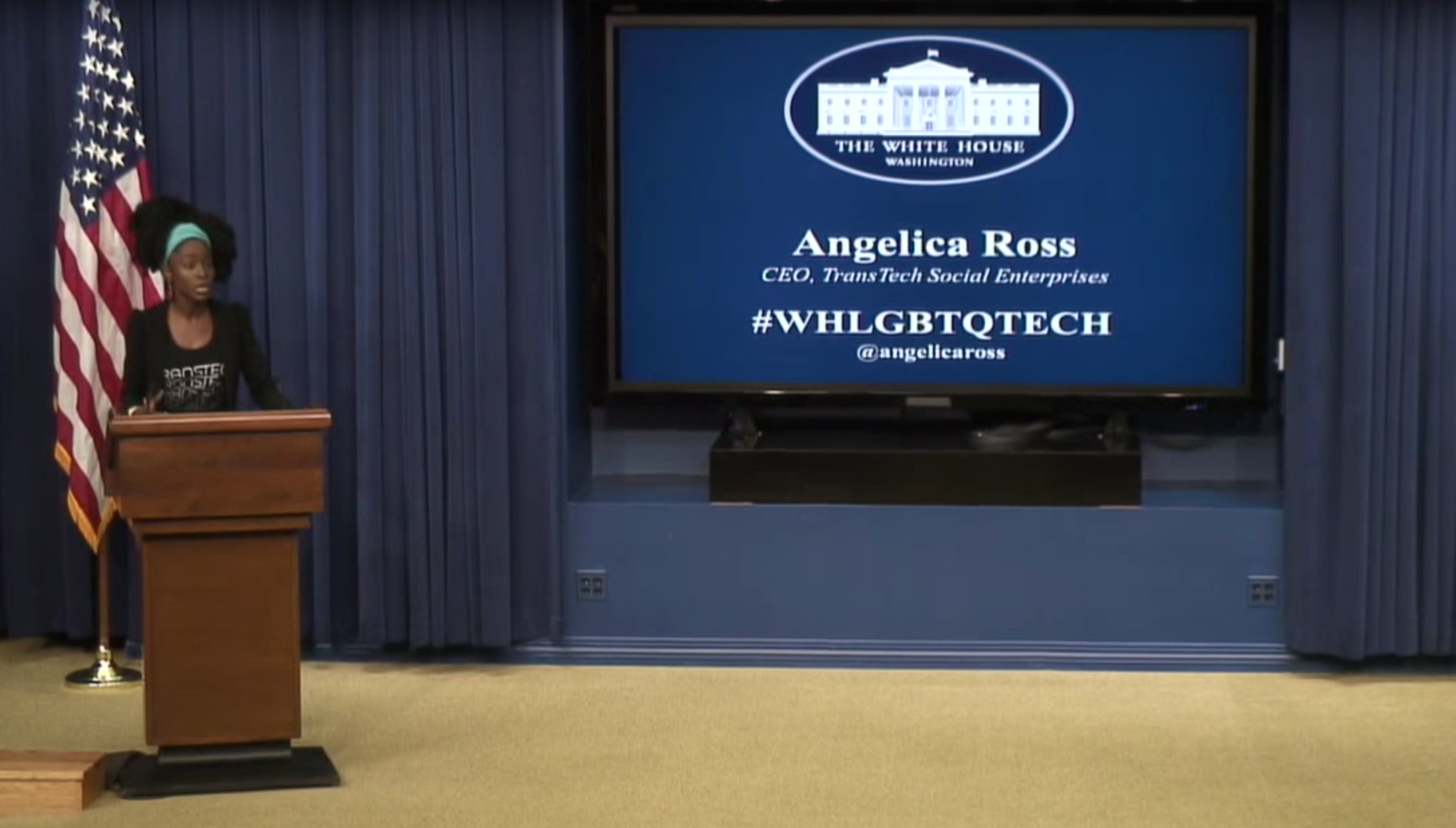Transgender and gender non-conforming people are at risk of facing injustice and discrimination wherever they are: in their childhood homes, schools, the workplace and even in line at the grocery store.
This discrimination can lead to missed education and professional development opportunities, which is where TransTech comes in. TransTech’s goal is to develop pipelines to employment and ultimately, independence, for trans people throughout the world.
TransTech Founder and CEO Angelica Ross (pictured above) knows first-hand how difficult it can be to get a job as a transgender person. When Ross began her transition to living as a woman, her employer fired her, her family alienated her and she was introduced to sex work and the adult industry. Ross eventually decided to teach herself how to build websites, and later worked with nonprofit organizations that were looking to serve transgender communities around employment. She soon realized that those types of services could be a lot more effective.
“I discovered most programs to be inadequate, as well as re-traumatizing and re-triggering for our population, as many of the programs just undervalue, underestimate and pigeonhole our community into very low expectation positions — you know, food service and manual labor without any sort of development for us to reach for anything else beyond that,” Ross told TechCrunch.
Trans people face unemployment at twice the rate of the general population, according to a 2011 national transgender discrimination survey conducted by The National Gay and Lesbian Task Force and the National Center for Transgender Equality.
Biases and discrimination result in adverse job outcomes for transgender people, with 47 percent of the people surveyed reporting being fired, not hired or denied a promotion because of their transgender or gender non-conforming identity. And a lot of those who are employed face discrimination. In fact, 90 percent of the transgender people surveyed reported experiencing harassment, mistreatment or discrimination, or took certain precautions to avoid it. Harrowing statistics like those are why TransTech Social is working to empower, educate and employ transgender people.
“I always have believed in the value of the diversity and resilience, and just really the different skill sets that our community has,” Ross said. “But we’ve never been able to find the right platform and find the right environment for us as a community — for us as a professional community. So that’s what I am doing with TransTech — creating that professional environment.”
TransTech offers education services in graphic design, coding, software like Microsoft Word, Excel and Google Docs, as well as administrative skills like typing. The program also teaches people about building a resume, doing well in an interview, filing taxes, finding the right bank and saving money.
“Trans people, especially trans people of color, have not routinely had a lot of access to technology,” Ross said. “When you drop out of school because of harassment or get kicked out of your home, [you miss out on] basic skills with data entry, Microsoft Office, Google Docs — things like that that will keep them from having office jobs and being in certain environments and being able to compete.”
In TransTech’s pilot program last year, Ross said, the organization found that there’s not a one-size-fits-all program for transgender people. It was initially set up as a 12-week training program, but TransTech realized that some people want to be able to drop in to workshops whenever they need a quick refresher, while others want a more structured program that offers ongoing mentorship and job contracts.
Trans people, especially trans people of color, have not routinely had a lot of access to technology. Angelica Ross, Founder and CEO of TransTech
There are three tiers of membership: Community (a free service that offers access to online and in-person workshops and drop-in days), Professional (a $99/month service that offers on-the-job training, contracts, workshops, professional equipment and mentorship) and Corporate (for companies that want to tap into the TransTech community). Corporate memberships are what allow TransTech to grow, make money and ultimately become a better fit to offer services to the transgender community at scale.
MillerCoors, for example, is just one of the corporate sponsors that gets access to TransTech’s talent pool, as well as access to online transgender competency training for employees and a platform to engage the company’s transgender and gender non-conforming employees. Other TransTech partners include the Human Rights Campaign and, most recently, the White House.
Ross attended the first-ever LGBTQ Innovation Tech Summit at the White House in July 2014 at the invitation of Dr. Kortney Ryan Ziegler of Trans*H4CK. Ross says Ziegler invited her because he wanted to make sure other transgender people were at the summit. That’s when she met Lesbians Who Tech Founder Leanne Pittsford, who then invited Ross to speak at the Lesbians Who Tech Summit in San Francisco in March. It was Pittsford who then asked her to participate in the second White House LGBTQ Tech and Innovation Summit last month.

Angelica Ross at the White House LGBTQ Tech and Innovation Summit in August 2015
“This time, they were actually featuring and highlighting me and starting with me at the summit,” Ross said. “So, before the White House CTO Megan Smith spoke, I spoke. Megan said they really wanted to start with me. They just said, ‘We really wanted to start with Angelica, because as a trans woman of color, she is working in an organization that is on the ground doing the work, and we want to uplift them.’
“They were totally uplifting my work and gave me a platform, and now I have an ongoing relationship with the White House. We’re working on some very, very, very big things for the trans community.”
Ross couldn’t share too many details, but she did say that she’s helping to develop a pipeline of employment to the White House for transgender people, as it relates to technology. TransTech currently serves 30 transgender people, but hopes to eventually reach transgender communities all over the world.
“So basically, I’m working on global domination,” Ross said. “I plan to have members globally. What I’m looking to do is expand in a way that allows us to provide more access and take advantage of the sort of ‘world is flat’ technology platform, where it doesn’t matter where you’re located.”
